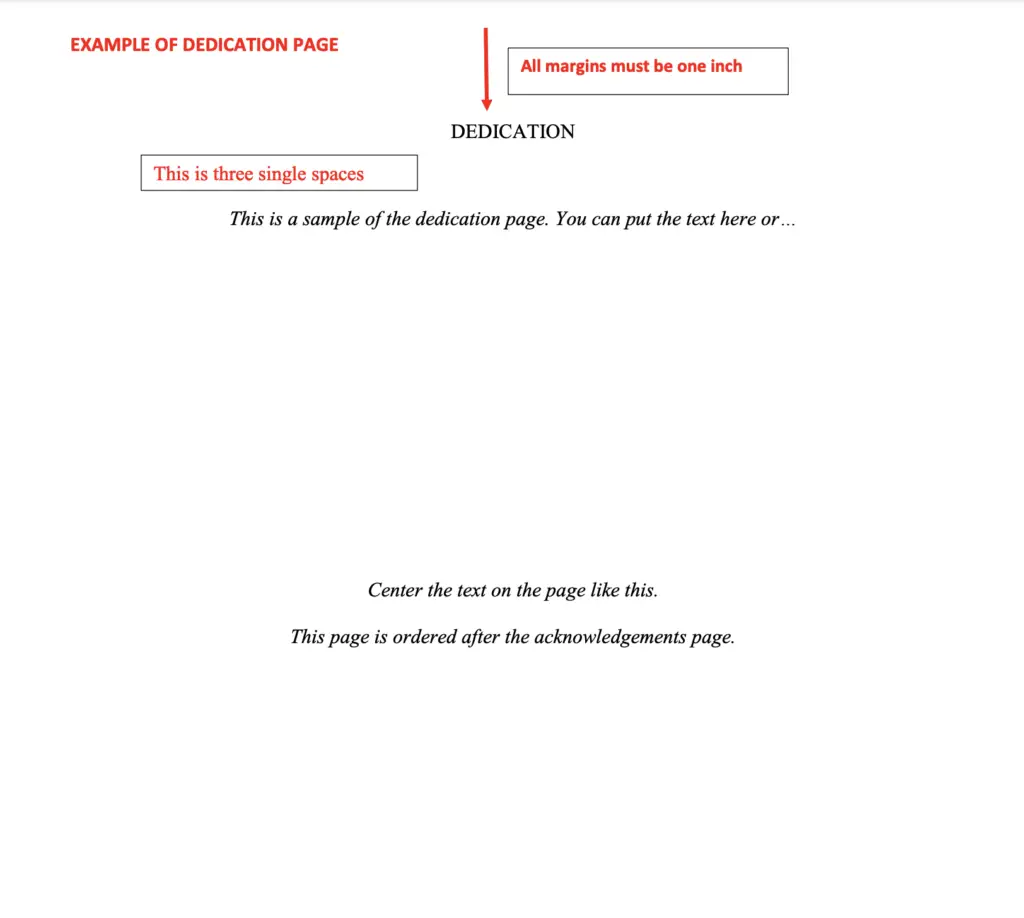Writing a dedication page for your thesis or dissertation is a great way to honor the people who have supported you throughout the journey of your research and writing. In this guide, we’ll show you everything you need to know about writing a dedication page for your thesis or dissertation. From formatting it to what you can include, we’ll run through all of the details to help you write your dedication page with confidence and gratitude.
What is a dedication page?
In academic writing (as well as book writing), the dedication page is where you can honor the people who have inspired or emotionally support you throughout your research and writing in a personal manner.
The dedication page is an optional section in a thesis or dissertation when it comes to academic writing.
Why should I include a dedication page in my writing?
The dedication page is not mandatory in most academic writing.
However, by paying tributes to the individuals or even the higher power who meant the most to you, you attach meaning to your work beyond the academic level.
A song is merely a song with lyrics, and that’s that. But if the same song is dedicated to someone, it will certainly entail special meanings to those who are dedicated and the dedicator (yourself). In other words, dedication serves to connect your work with the people who mean the most to you.
The same goes for your work. Do you agree?
Where does the dedication page appear in a paper?
The dedication page should appear before the main body of a thesis or dissertation. But every institution has its own requirements. You should always check the formatting guidelines provided by your school, faculty or department.
For this matter, we took a quick tour of the formatting guidelines for the top three universities in the US. And we’ve already found 3 variations.
| University or department | Specification on the dedication page (if any) |
| Massachusetts Institute of Technology Source: MIT Specifications for Thesis Preparation | No mention of the dedication page. |
| Harvard University – Graduate School of Arts & Sciences Source: Formatting Your Dissertation | The dedication is optional and regarded as part of the “front matter”, which should appear after the table of contents. |
| Stanford University – Student Services Source: Format Requirements for Your Dissertation or Thesis | The dedication should appear after the abstract and before the table of contents. |
How long is a dedication page?
A dedication page can be as short as one sentence, if not in a few short paragraphs.
Who should I include on the dedication page?
In academic writings, the dedication page is where you can show your gratitude to the individuals (and even the higher power) who have inspired you or emotionally support you on a personal level throughout your work.
They may or may not involve in your research work. You may include:
- God or the higher power
- Spouse
- Partners
- Family
- Friends
What is the formatting of a dedication page?
Always check the formatting guidelines provided by your school, faculty, or department.
As a general rule, the title, as well as the text, should be aligned in the center of the page like this:

What is the tone and style of a dedication page?
The tone of the dedication page can be formal or informal. It can be personal, sometimes even emotional and spiritual.
Formal phases to begin a dedication:
*Work: thesis/dissertation/report/research
This [work] is dedicated to…
Example: This project is dedicated to Mr. Smith, our teacher who helped and guided us to successfully complete this work.
I dedicate this [work] to…
Example: I dedicate this thesis to my father and my mother, who with love and effort have accompanied me in this process, without hesitating at any moment of seeing my dreams come true, which are also their dreams
I am dedicating this [work] to…
Example: I am dedicating this thesis to my late grandfather who taught me all about perseverance. His memories continue to keep me going in every single day of my life
*Work: thesis/dissertation/report/research
Informal phases to begin a dedication:
For my…
Example: For my Almighty God, the reason for my existence.
To…
Example: To Bruno, who has been my support in the difficulties.
To my…
Example: To my dearest wife Jenny, to my lovely little girl Jin, to my parents, to my brothers William, John and Paul, and to all those who made this thesis possible.
The dedication page vs the acknowledgement page, what’s the difference?
While both the dedication page and acknowledgement page let you show appreciation for the help and support in your research and writing, there are some major similarities and differences between the two.
Dedication in academic writing
On a dedication page, you honor a particular group of people or an individual for inspiring or motivating you for completing the project or paper. It can be personal, emotional, or even spiritual and does not necessarily have anything to do with the academic aspects.
You dedicate your research work to the people who mean the most to you, such as the higher power, your core family members, a particular individual, friends, or someone who has a special role in your life.
Acknowledgment in academic writing
In acknowledgments, you recognize resources (e.g. grants or funding), institutions as well as individuals that are involved or have support in the course of your research and writing. These parties directly play a role in your academic career. Here, you disclose as much academic-related information as possible.
The Similarities
These sections, usually optional, should be no longer than one page.
Depending on the requirements of school or academic department, they can appear before or after the table of contents in your paper.
The Differences
The key difference between acknowledgement and dedication is that the former is more formal and the latter is more personal.
Acknowledgement usually recognizes the contributions of those who were directly involved in the research, whereas dedications are a way for the writer to pay tribute to individuals who have had a significant personal or emotional impact on their life or work.
It is common for people to dedicate their writing to God or another higher power who they believe provided them with spiritual support during the writing process.”
Here’s a brief comparison table showing the main differences between the two:
| Dedication | Acknowledgements | |
| Whom/what to thank? | Spouse, partner, family, friends or community members. | • Grants and other funding assistance • Copyrighted materials used in your writing • Citation of the previously published materials • People who have support or contribute to your work: ◦ Professors, supervisors, and teachers ◦ Lab assistants, or academic staff ◦ College/school/faculty/departments ◦ Classmates, colleagues, friends and family |
| Where to put it? (Check your school’s requirements.) | Before the abstract and acknowledgement page. | Before the abstract. |
| Tone | Formal or informal. Can also be personal or sentimental. | Formal and factual. |
| Length | Can be as short as one sentence, if not usually in a few short paragraphs | Within 1 page with longer paragraphs with the resources received cited explicitly. |
If you want to check out examples of dedication for projects, reports, theses, dissertations, and books, also read: Examples of Well-Written Dedication Section
Acknowledgement Examples for School/College Projects
Most popular
Acknowledgement For School/College Projects [7 Examples]
Acknowledgement for English Project [5 Examples]
Acknowledgement for Project Class 11 and 12
Acknowledgement for Project of Class 8, 9 and 10
By subjects
Acknowledgement for Accounting Project [3 Examples]
Acknowledgement for Business Studies Project [5 Examples]
Acknowledgement for Chemistry Project [5 Examples]
Acknowledgement for Computer Project [5 Examples]
Acknowledgement for Economics Project [5 Examples]
Acknowledgement for English Project [5 Examples]
Acknowledgement for Geography Project [5 Examples]
Acknowledgement for History Project [5 Examples]
Acknowledgement for Maths Project for Students [5 Examples]
Acknowledgement for Physics Project [5 Examples]
Acknowledgement for Social Science Project [5 Examples]
Others
Acknowledgement for Group Project [5 Examples]
Acknowledgement for Graduation Project [5 Examples]
Acknowledgement for Disaster Management Project [3 Examples]
Acknowledgement for Yoga Project [3 Samples]
Other Popular Acknowledgement Examples
For work or business
Acknowledgement Receipt of Payment [4 Examples]
Acknowledging Receipt of Documents: A Quick Guide with Examples
Acknowledgement for Presentation [9 Examples]
Acknowledgement for Job Offer [3 Examples]
Acknowledgement for Business Plan [4 Examples]
Acknowledgement for Work Immersion [5 Examples]
Acknowledgement of Receipt of Appraisal [3 Examples]
Acknowledegment of Debt [5 Examples]
Resignation Acknowledgement for Employers [5 Examples]
Academic
Acknowledgement for Research Paper [5 Examples]
Acknowledgement for Internship Report [5 Examples]
Acknowledgement for Thesis and Dissertation [15 Examples]
Acknowledgement for Portfolio [5 Examples]
Acknowledgement for Case Study [4 Examples]
Acknowledgement for Academic Research Paper [5 Examples]
Acknowledgement for College/School Assignment [5 Examples]
Acknowledgemet to God in Reports [5 Examples]
Others
Acknowledgement to Funeral Attendees [5 Examples]
Funeral Acknowledgement Templates (for Newspapers and Websites)
Common Website Disclaimers to Protect Your Online Business
Notary Acknowledgement [5 Examples]
How-to Guides on Academic Writing and Others
Most popular
How to Write an Acknowledgement: The Complete Guide for Students
How to Write an Acknowledgement for College Project?
How to Write a Dedication Page for a Thesis or Dissertation?
More on acknowledgements
How to Write Acknowledgment for a Dissertation or a Thesis?
Is Acknowledgement and Dedication the Same?
Thesis or Dissertation
How to Write a Master’s Thesis: The Ultimate Guide
How to Write a Thesis Proposal?
How to Write an Abstract for a Thesis?
How to Write a Preface for a Thesis?
Others
How to Write an Introduction for a Research Paper?
7 Real Research Paper Examples to Get You Started
How to Write Cover Letter for an Internship Program?
How to Write an Internship Acceptance Letter?
How to Write a Leave Application? For Schools and the Workplace
How to Write a Resignation Letter?
Introduction to Academic Writing
By O.P. Jindal Global University
Duration: 16-hour
Cost: FREE
Gain an in-depth understanding of reading and writing as essential skills to conduct robust and critical research for your writing.
Writing in English at University
By Lund University
Duration: 24-hour
Cost: FREE
Learn how to structure your text and arguments, quote sources, and incorporate editing and proofreading in your academic writing.
Academic English: Writing Specialization
By the University of California, Irvine
Duration: 6 months
Cost: Free 7-day trial, USD39 per month
The skills taught in this Specialization will empower you to succeed in any college-level course or professional field. You’ll learn to conduct rigorous academic research and to express your ideas clearly in an academic format.
Share your Course Certificates in your LinkedIn profile, on printed resumes, CVs, or other documents.


